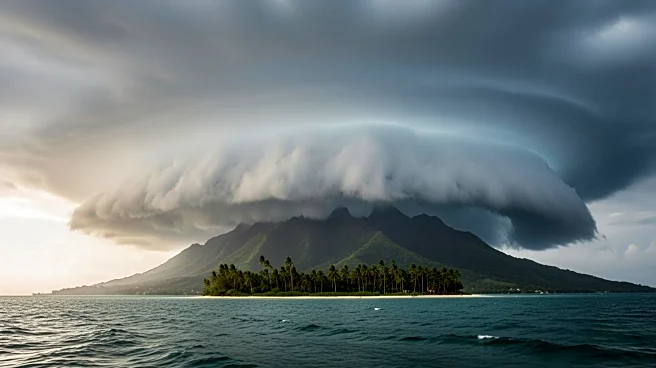What's Happening?
Hurricane Melissa has intensified into a Category 4 storm, posing a significant threat to Jamaica and Haiti with catastrophic flash flooding and landslides. The National Hurricane Center (NHC) has issued
warnings of extensive infrastructural damage, prolonged power outages, and community isolation. The hurricane, sustaining winds of 140 mph, is expected to make landfall in Jamaica on Monday night. The NHC has urged residents to seek shelter immediately, anticipating rainfall totals between 15 to 30 inches, with some areas potentially receiving up to 40 inches. The storm has already resulted in fatalities in Haiti and the Dominican Republic.
Why It's Important?
The impact of Hurricane Melissa is expected to be severe, with potential long-term consequences for the affected regions. The storm's intensity and slow movement increase the risk of prolonged flooding, which could devastate infrastructure and disrupt communication and power services. The economic and social repercussions for Jamaica and Haiti could be significant, affecting tourism, agriculture, and daily life. The situation underscores the importance of disaster preparedness and response, particularly in regions prone to hurricanes. The storm's trajectory may also influence weather patterns in the southern United States, although current forecasts suggest limited direct impact.
What's Next?
As Hurricane Melissa approaches, emergency services and government agencies in Jamaica and Haiti are likely to intensify their preparations and response efforts. Evacuation plans and shelters will be critical in minimizing casualties and damage. The international community may offer aid and support to assist in recovery efforts post-landfall. Monitoring the storm's path will be essential to anticipate any shifts that could affect other regions, including the United States. The aftermath will likely involve extensive rebuilding and recovery efforts, with potential international assistance.
Beyond the Headlines
The occurrence of Hurricane Melissa during a 'quiet' hurricane season highlights the unpredictability of weather patterns and the ongoing challenges posed by climate change. The storm's impact may prompt discussions on climate resilience and the need for robust infrastructure to withstand extreme weather events. Additionally, the recent cuts to NOAA's climate disaster database by the Trump Administration may affect the ability to track and respond to such events effectively, raising concerns about preparedness and resource allocation.












